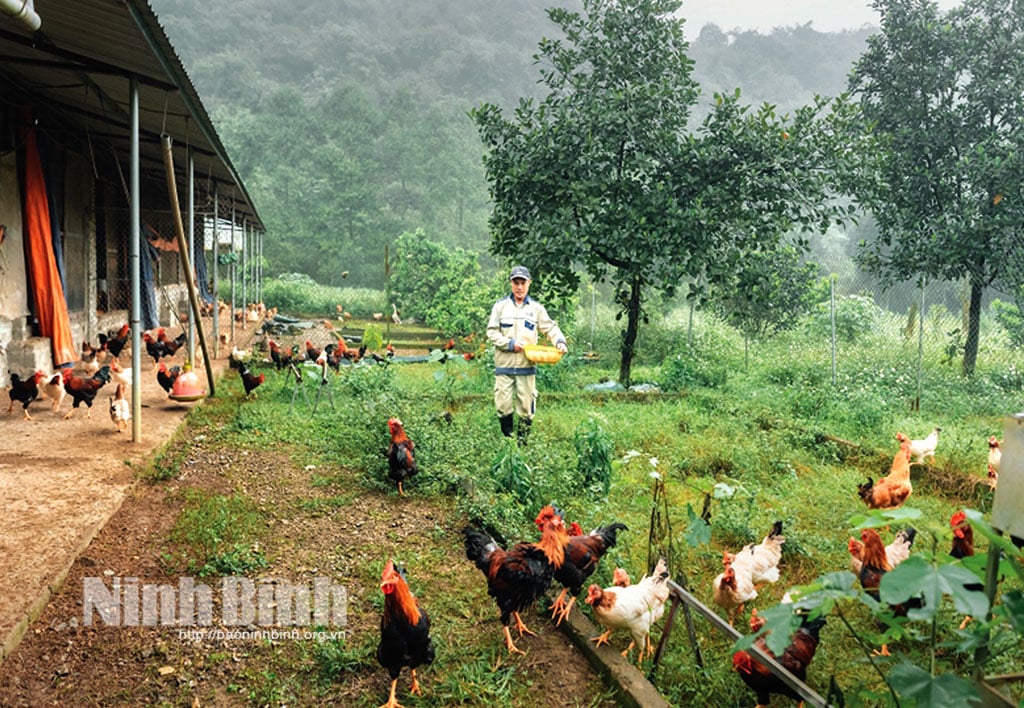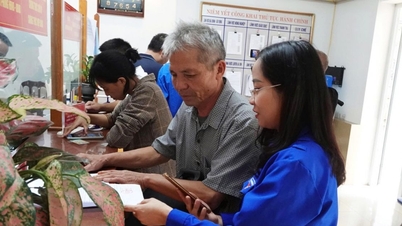Since the beginning of the year, the epidemic situation in livestock herds across the country has been complicated, with tens of thousands of sick livestock and poultry having to be destroyed. In Ninh Binh, there have also been some outbreaks of African swine fever and avian influenza. Faced with the risk of the epidemic continuing to increase sharply in the coming time, specialized sectors and localities are actively implementing synchronous solutions to control and prevent livestock and poultry diseases, and protect production.

Raising free-range chickens in Dong Son commune, Tam Diep city. Photo: Ngoc Linh
According to reports from veterinary agencies and localities, since the beginning of the year, African swine fever has appeared in 410 communes in 40 provinces and cities, forcing the destruction of over 17,400 pigs (an increase of 53.74% over the same period in 2023); 44 communes in 13 provinces and cities have had Foot and Mouth Disease; 34 provinces and cities have detected animals suspected of being infected with Rabies; over 60 communes in 9 provinces have had Lumpy Skin Disease; 7 provinces have had Avian Influenza A/H5N1, forcing the destruction of over 12,000 poultry, in particular, 1 person died from CGC A/H5N1 virus infection and 1 person infected with CGC A/H9N2 virus. The risk of the epidemic will continue to increase sharply in the coming time, seriously affecting food supply, consumer price index (CPI), people's health and the environment.
In our province, there are also sporadic outbreaks of diseases in livestock, most commonly African swine fever. Specifically, in Yen Mo district, at its peak, up to 7/17 communes and towns in the district had this disease.
Comrade Nguyen Thi Len, Head of the Department of Agriculture and Rural Development of Yen Mo district, said: Yen Mo is one of the key localities in animal husbandry in the province with a relatively large number of cattle and poultry. The whole district currently has nearly 5,000 buffaloes and cows, more than 30,000 pigs, over 483,000 poultry, and 1,500 goats. It is worth mentioning that in addition to large-scale livestock households and farms, there are also many small-scale livestock households and barns located in residential areas, making disease management extremely difficult. Since the beginning of the year, a number of communes and towns have had animal epidemics, with avian influenza in Yen Dong and Yen Phong at the beginning of the year; in addition, with African swine fever, this is a disease for which vaccines are not yet widely available, and the rate of spread is fast, so at one point the whole district had up to 7 localities with the epidemic.
In order to limit damage to people and protect production, Yen Mo district has proactively implemented prevention and control measures, including promoting vaccination with the main motto of disease prevention. From April 29 to June 20, the whole district has deployed nearly 6,770 doses of rabies vaccine (reaching 96.7%), 4,550 doses of lumpy skin disease vaccine (reaching 91%), 372,028 doses of avian influenza vaccine (reaching over 99%). In particular, when an epidemic occurs, vaccination is organized to surround all poultry in the commune with the epidemic and the threatened communes. In addition, the district also tightly organizes the monitoring system to promptly detect, report, manage and control epidemics from farmers in villages, residential groups to the veterinary system. Thanks to that, up to this point, most of the epidemics in livestock have been controlled.
According to the Provincial Department of Animal Husbandry and Veterinary Medicine, in the first 6 months of the year, the livestock sector continued to face a number of difficulties and challenges due to the impact of market prices, especially diseases. In particular, in addition to the avian influenza epidemic that appeared at the beginning of the year, African swine fever continued to recur sporadically in some localities. In this situation, the Department advised the Department of Agriculture and Rural Development to establish working groups to directly inspect and urge the work of disease prevention and control, handling and destroying sick and suspected sick animals, organizing vaccination, spraying disinfectants to quickly control and contain the disease, not allowing new outbreaks to occur.
As of mid-June 2024, the whole province had vaccinated more than 2 million poultry against Avian Influenza (reaching 95.6% of the plan), nearly 30,700 buffaloes and cows against Lumpy Skin Disease (reaching 88.7% of the plan); 675 animals against Foot and Mouth Disease and nearly 48,500 dogs and cats against Rabies (reaching 91.5% of the plan).
Along with vaccination, the specialized sector also promotes information and propaganda work to raise people's awareness and responsibility about the risk of disease outbreaks and measures to prevent and control diseases, and ensure biosafety in livestock; build and expand disease-free livestock facilities and areas. Deploy peak periods of general cleaning, disinfection, and environmental decontamination. Regularly and proactively take samples to monitor the circulation of disease-causing viruses... Thanks to drastic and synchronous solutions, the livestock and poultry epidemic situation in the province is basically under control, and livestock farming has developed well.
According to statistics, in the first 6 months of the year, the total herd of pigs, buffaloes, goats and poultry all increased compared to the same period in 2023, with the strongest increase being in poultry, currently reaching 6.49 million heads, up 2.9%. The output of fresh meat is estimated at nearly 35 thousand tons, up 4.7%.
Despite the positive results, the current situation of animal diseases across the country is still complicated, combined with unusual weather changes and high temperatures, creating a favorable environment for diseases to break out and spread among livestock. Therefore, the Department of Agriculture and Rural Development recommends that livestock farmers proactively monitor closely, increase nutrition, vaccinate against diseases, regularly disinfect and clean barns; especially, immediately notify the authorities and local authorities when detecting diseases in livestock.
Nguyen Luu
Source: https://baoninhbinh.org.vn/chu-dong-phong-chong-dich-benh-tren-gia-suc-gia-cam/d2024062621512460.htm



![[Photo] Prime Minister Pham Minh Chinh chaired a meeting to evaluate the operation of the two-level local government model.](https://vphoto.vietnam.vn/thumb/1200x675/vietnam/resource/IMAGE/2025/10/29/1761751710674_dsc-7999-jpg.webp)
![[Photo] Hue: Inside the kitchen that donates thousands of meals a day to people in flooded areas](https://vphoto.vietnam.vn/thumb/1200x675/vietnam/resource/IMAGE/2025/10/29/1761738508516_bepcomhue-jpg.webp)

![[Photo] Prime Minister Pham Minh Chinh chaired a meeting to discuss solutions to overcome the consequences of floods in the central provinces.](https://vphoto.vietnam.vn/thumb/1200x675/vietnam/resource/IMAGE/2025/10/29/1761716305524_dsc-7735-jpg.webp)









































































![[Live] Concert Ha Long 2025: "Heritage Spirit - Brightening the Future"](https://vphoto.vietnam.vn/thumb/402x226/vietnam/resource/IMAGE/2025/10/29/1761743605124_g-anh-sang-am-thanh-hoanh-trang-cua-chuong-trinh-mang-den-trai-nghiem-dang-nho-cho-du-khach-22450328-17617424836781829598445-93-0-733-1024-crop-1761742492749383512980.jpeg)






























Comment (0)